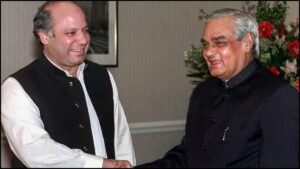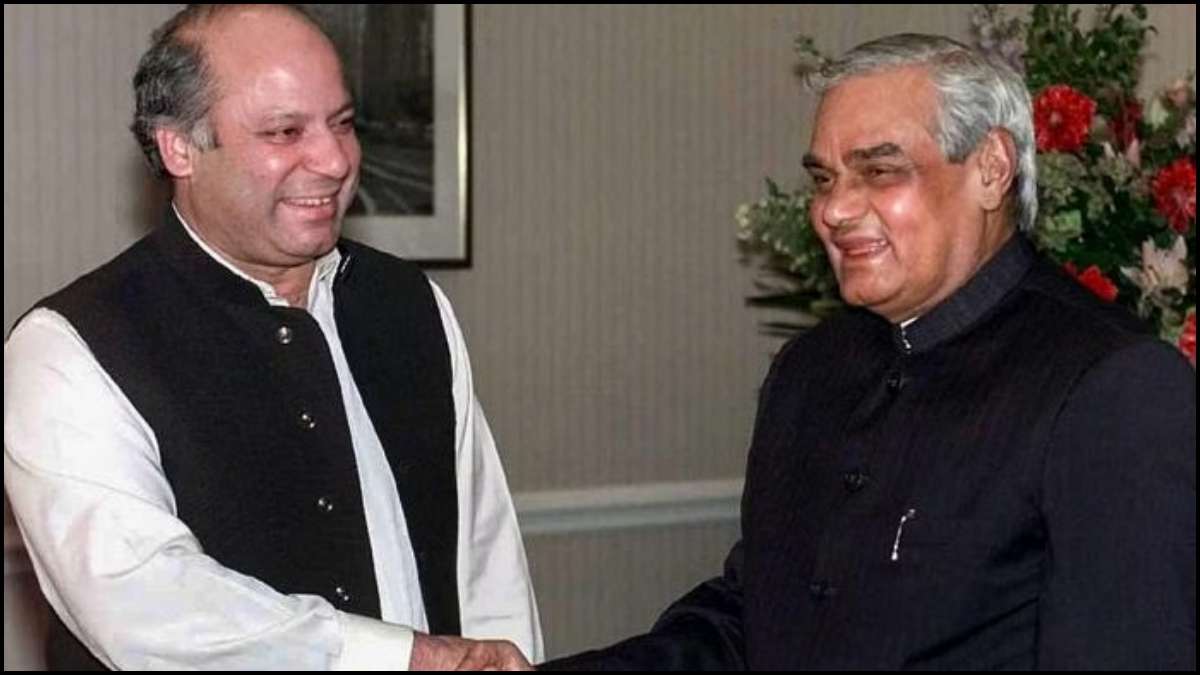The Kargil War of 1999 remains one of the most significant and contentious conflicts between India and Pakistan. Marking its 25th anniversary, the war is remembered not only for its high-altitude combat but also for the diplomatic fallout that followed. Recently, Nawaz Sharif, the newly-appointed President of Pakistan Muslim League-Nawaz (PML-N), made headlines by admitting that Pakistan’s “violation” of the Lahore Declaration led to the Kargil misadventure. This article delves into the events leading up to the war, the breach of the Lahore Declaration, and its lasting impact on Indo-Pak relations.

Vajpayee’s Visit and the Lahore Declaration
In February 1999, Indian Prime Minister Atal Bihari Vajpayee took a historic step towards peace by visiting Lahore, Pakistan. This visit culminated in the signing of the Lahore Declaration with then-Pakistani Prime Minister Nawaz Sharif. The declaration was a landmark agreement aimed at de-escalating tensions and promoting peaceful resolution of disputes, particularly over the contentious Kashmir region.
The Lahore Declaration included commitments to avoid accidental or unauthorized use of nuclear weapons, establish communication to reduce the risk of conflict, and intensify efforts to resolve the Kashmir issue through peaceful means. This accord was seen as a significant breakthrough in Indo-Pak relations, which had been fraught with hostility and suspicion since their partition in 1947.
‘Violation’ of Lahore Declaration and the Kargil War
However, the optimism was short-lived. Just months after the Lahore Declaration, Pakistani forces crossed the Line of Control (LoC) in May 1999, infiltrating the Kargil district of Jammu and Kashmir. This operation, codenamed ‘Operation Badr’, saw Pakistani soldiers and militants occupy strategic high-altitude positions, threatening India’s vital National Highway 1A and aiming to cut off the link between Kashmir and Ladakh.
The Indian Army, initially taken by surprise, launched ‘Operation Vijay’ to reclaim the occupied territories. The conflict, fought at altitudes exceeding 18,000 feet, was one of the most challenging military operations in recent history. The Indian Air Force played a crucial role, deploying Bofors FH-77B howitzers and conducting extensive bombardments to dislodge the intruders.
Nawaz Sharif’s Revelation
In a recent address to the PML-N general council, Nawaz Sharif acknowledged Pakistan’s breach of the Lahore Declaration. He described the incursion as a “fault” and a significant miscalculation. Sharif’s admission highlights the disconnect between Pakistan’s civilian leadership and its military, particularly under the then-military chief Pervez Musharraf, who orchestrated the Kargil operation without informing Sharif’s government.
This revelation has reignited discussions about the internal dynamics of Pakistan’s governance and the military’s dominance in strategic decision-making. It also underscores the fragility of peace initiatives in the region, where trust deficits and unilateral actions can swiftly derail diplomatic progress.
Aftermath of the Kargil War
The Kargil War ended in July 1999 with India successfully reclaiming its posts, but at a significant cost. Both sides suffered heavy casualties, and the conflict intensified international scrutiny on Pakistan. The war also strained Indo-Pak relations, leading to a severance of diplomatic ties and a surge in India’s defense spending.
Also Read : Colombia and Bolivia Break Diplomatic relations with Israel Over Gaza War
Nawaz Sharif’s political career took a tumultuous turn post-Kargil. He was ousted in a military coup led by Musharraf in October 1999 and spent years in exile. Musharraf’s role in the Kargil conflict remained contentious, with his later claims of the operation being a military success contrasting sharply with Pakistan’s diplomatic isolation and internal dissent.
Legacy and Lessons
The Kargil War and the violation of the Lahore Declaration serve as stark reminders of the complexities of Indo-Pak relations. Despite numerous attempts at peace, the underlying issues, particularly over Kashmir, continue to pose significant challenges. Nawaz Sharif’s recent admissions may offer a path towards introspection and reconciliation, emphasizing the need for transparency and civilian oversight in strategic matters.
Conclusion
As we mark 25 years since the Kargil War, it is crucial to reflect on the lessons learned and the importance of sustained dialogue and trust-building measures between India and Pakistan. The Kargil conflict underscored the perils of unilateral military actions and the fragility of peace accords in the face of deep-seated mistrust. Moving forward, both nations must strive to honor their commitments and seek lasting solutions to their enduring conflicts.

